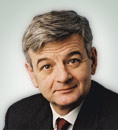What if Zero Interest Rates Are the New Normal?
TOKYO – Ever since major central banks cut short-term interest rates close to zero in autumn 2008, and subsequently purchased huge volumes of bonds as part of their quantitative easing operations, economists have debated about when and how fast the “exit” from these unorthodox monetary policies would be.
But, a decade later, developed-economy interest rates are stuck far below pre-crisis levels and likely to remain so. Germany’s ten-year bond yield of -0.02% (as of March 23) signals market expectations that the European Central Bank will maintain zero policy rates not just until 2020 (the official ECB forward guidance) but to 2030. Japanese bond yields imply zero or negative interest rates for even longer. And while ten-year yields in the United States and the United Kingdom are just above 1% and 2.4%, respectively, both of these suggest minimal or no increases in policy rates for another decade.
The 2008 financial crisis may have inaugurated a full quarter-century of dramatically lower interest rates. In this new normal, still more unorthodox policies – including forms of monetary finance – may in some countries be needed to maintain reasonable growth.
The financial crisis occurred in 2008 because deficient regulation allowed huge risks to develop within the financial system itself. But the depth of the subsequent recession, and the long period of slow growth that followed, was the result not of continued financial system fragility, but of the excessive leverage in the real economy that had developed over the previous half-century. Between 1950 and 2007, advanced economies’ private-sector debt (households and companies) grew from 50% to 170% of GDP and adequate growth seemed attainable only if debt grew far more rapidly than nominal GDP.
After the crisis, loan growth turned negative and remained depressed for many years, not because an impaired financial system lacked the capital to extend credit, but because overleveraged households and companies were determined to pay down debt even if interest rates were zero. The same pattern was observed in Japan in the 1990s.
In this environment, large-scale fiscal stimulus was the only way to achieve even anemic growth. Britain’s public-finance deficit grew to 10.1% of GDP in 2009, the US deficit ballooned to 12.17%, and even the eurozone’s increased to 6.3%. But the inevitable rise in public debt led many governments to conclude that these large deficits must soon be curtailed. Fiscal austerity, combined with continued private deleveraging, led to inflation rates stuck below target, disappointing growth in real wages, and a populist political backlash.
By 2016, it seemed that governments and central banks were “out of ammunition,” monetary or fiscal, and economists debated whether any policies could avoid secular stagnation when interest rates were already zero and public debt levels were already high. Some, including me, broke the ultimate policy taboo and suggested that we might need to consider monetary finance of increased fiscal deficits. Former Federal Reserve Chairman Ben Bernanke argued that as long as the quantity of such finance was determined by independent central banks, useful stimulus could be achieved without excessive inflation.
Just two years after the gloomy 2016 nadir, however, the skies seemed dramatically clearer. By 2018, forecasts of global growth and inflation had risen significantly, and central banks and markets were again focused on the long anticipated “exit” from unorthodox policies. It is vital to understand what drove this sudden improvement.
The answer is simple: massive fiscal expansion, which in two major economies was partly or wholly financed by central bank money. The US fiscal deficit rose from 3.9% of GDP in 2015 to 4.7% in 2018 and a projected 5.0% in 2019: China’s grew from below 1% in 2014 to over 4%, and Japan’s remained around 4%, abandoning previous plans for a reduction to zero by 2020. And while the US fiscal expansion was financed by bond sales to the private sector, in China the central bank indirectly financed large bond purchases by commercial banks, while in Japan, the entire net increase in public debt is financed by central bank purchases of government bonds. The global economy recovered because the world’s three largest economies rejected the idea that high public debt burdens made further fiscal expansion impossible.
But the impact of that stimulus has faded. US growth is slowing as the one-off impact of President Donald Trump’s tax cuts wears off; China is struggling to curb excessive leverage and manage the impact of Trump’s tariff increases on exports and confidence; and, in October, Japan will implement a long-planned sales tax increase which threatens to slow consumption growth. Eurozone growth, too, is slowing in the face of declining external demand.
So we are back to facing the same question as in 2016: What to do if stagnation threatens when interest rates are already close to zero? Among the proposed answers are variants of monetary finance. Proponents of “modern monetary theory” argue that money-financed fiscal expenditure should be the normal mechanism for managing nominal demand: and the “Green New Deal” presents monetary finance as one option for financing socially and environmentally desirable investment.
The valid insight behind these propositions – that governments and central banks together can always create nominal demand – was explained by Milton Friedman in an important 1948 essay. But it is vital also to understand that excessive monetary finance is hugely harmful, and it is dangerous to view it as a costless route to solving long-term challenges, rather than a demand-management tool for use in exceptional circumstances.
Faced with slow growth, political discontent, and large inherited debt burdens, monetary finance cannot be a taboo option. In Japan, permanent monetary finance is already occurring, even though the central bank denies it. The challenge is to ensure that it is used only within disciplines such as Bernanke proposed, rather than assuming that pre-crisis normality will return any time soon.
Adair Turner, Chairman of the Institute for New Economic Thinking and former Chairman of the UK Financial Services Authority, is Chair of the Energy Transitions Commission.
Copyright: Project Syndicate, 2019.
www.project-syndicate.org
This article is brought to you by Project Syndicate that is a not for profit organization.
Project Syndicate brings original, engaging, and thought-provoking commentaries by esteemed leaders and thinkers from around the world to readers everywhere. By offering incisive perspectives on our changing world from those who are shaping its economics, politics, science, and culture, Project Syndicate has created an unrivalled venue for informed public debate. Please see: www.project-syndicate.org.
Should you want to support Project Syndicate you can do it by using the PayPal icon below. Your donation is paid to Project Syndicate in full after PayPal has deducted its transaction fee. Facts & Arts neither receives information about your donation nor a commission.





















